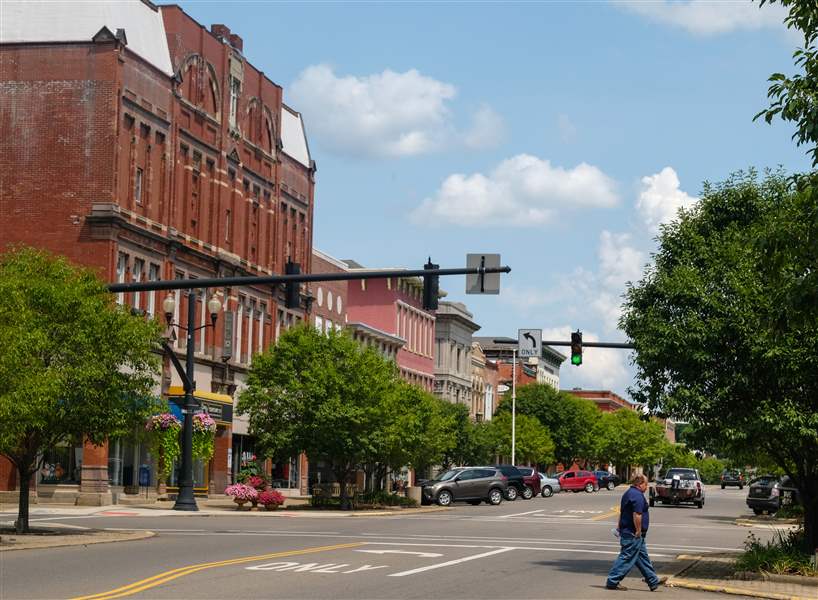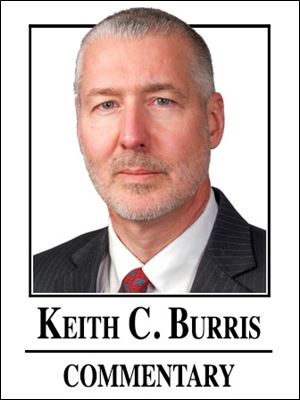
KEITH BURRIS
A walk with the dead in Coshocton
9/16/2018

Main Street in Coshocton, Ohio.
THE BLADE/JEREMY WADSWORTH
Buy This Image
I DROVE, over Labor Day weekend, to the little town where I grew up — Coshocton, Ohio — listening to the philosopher Roger Scruton talk about Edmund Burke and the power of custom and memory.
I drove overland, past Weirton, Steubenville, and around Tappan Lake. I’d forgotten how big a lake it is and had never seen so many boats on water, except for a sailboat race on Long Island Sound.

The Library of Congress has preserved this map of Coshocton County, Ohio, from 1850.
I came at last to Cadiz, Ohio, birthplace of Clark Gable, and then Newcomerstown, boyhood home to Woody Hayes and Cy Young before him. They are both memorialized on a mural at the Newcomerstown McDonald’s where once a fine old truck stop stood.
If you were raised in small town Ohio, you never heard of a diner. We had truck stops and “greasy spoons.” The truck stop stayed open all night — thrilling to high school kids.
When I go home I don’t need to look for the ghosts of my life. They come looking for me, especially my parents and my grandfather.
But places for these ghosts to inhabit are dwindling. The church my family and grade school classmates attended is still there, thank God. But that’s about it.
I go to a restaurant in Coshocton, once classy and now not so, because it is the only one left that my grandfather frequented. It was owned by a great old local family then, friends with my father and grandfather. The elegant country club, where Robert Taft the elder and Rutherford B. Hayes ate and Hayes allegedly slept, has been torn down to make way for prefab, trailer-like structures and weeds. I learned to swim there and swam every day of every summer. I learned the rudiments of tennis and golf there, too.

My grandfather took every evening meal in the sundown of his life in the dining room of the Coshocton Town and Country Club. My parents’ wedding reception was there. The reception for one of my sisters, when she was married, was there. The reception after my mother’s funeral was there. A waitress carried trays of Bloody Marys to the guests, which I imagine pleased my mother greatly.
Some years ago, I wrote to my cousin Larry, who had a career in Hollywood and now writes novels for himself, about my desire to move back to Coshocton in my sundown years. He grew up there too, same church and school. His father and my father were in the Lions Club together, related by marriage and business, and fellow swells. Both men knew how to have a good time. Larry’s father was a distinguished attorney and his mother a true renaissance woman. They hosted the annual family Christmas party. Larry wrote back a touching and truthful letter. The town you knew, he said, no longer exists.
And every time I go there, this seems truer — ruthlessly truer. The factories are long gone, most of them razed and planted or paved over. The last real one closed a year or so ago.
Each time I visit, another limb is missing, like a diabetic being whittled down. The beautiful, old town I knew as a kid, which my grandfather and father bestrode as men of substance and verve, town fathers, is indeed no more, destroyed by NAFTA and the global markets. The economy of the town was decimated, and then the town itself, almost as an act of rage or despair, destroyed large chunks of itself. So it’s not just the jobs that are gone, but many notable buildings and much of the web of connection.
When in Coshocton, I sometimes go to a barber whose shop is in the back of the local bowling alley. He’s one observant, insightful dude and could explain the Trump phenomenon to the talking heads on TV in five minutes, if they gave him the time. He’s watched his town be wrecked, year by year. Yet he and his children have chosen to stay in a town with few prospects, because it is home.
At the barber shop where my father and grandfather got their hair cuts on Main Street back in the day — Gallimore and Lane — I recall that a photo of Johnny Cash hung on the wall. Not the president, and not even Woody Hayes, but Johnny Cash.
I never knew our town was “Appalachian” growing up. There were too many engineers and chemists working at the GE plant. I had three best friends in high school. One’s father was a mathematician, who paced the floor with her the night of the Chicago convention in 1968. Another’s father was a doctor, who started a newspaper he funded himself. The town already had one paper, owned by a family with deep roots in newspapering. Now that paper is a Gannett McNews sheet. My third friend’s father had been police chief in Detroit. People wanted to live in Coshocton.
I am at an age in which I often dream about my dead parents. They are fully restored and not infirm in my dreams. They are in their vital years, as is my grandfather. This is my small, personal communion of the saints. I cannot imagine that my grandfather would have allowed the country club to be razed, or the old high school, or the house my mother grew up in, or the grade school where my wife and I both went to kindergarten and where we took our children, in their earliest years, on visits home, to swing on the swings.
Cousin Larry was right.
When Burke wrote about the “democracy of the dead,” he was speaking of tradition and custom. Our ancestors lead us if we let them. But I wonder if they do not also chastise us from the grave when we do not. This is why we preserve buildings of historic, and, yes, even sentimental, significance. This is why I go to that once classy restaurant. My grandfather broke bread there.
Driving back to Pittsburgh via Wheeling and little Washington, I thought that Pittsburgh really is, as Brian O’Neill of the Pittsburgh Post-Gazette would have it, “the Paris of Appalachia.” But Appalachia means something different than it did in my childhood. Then it meant a way of life. Now it means a way of life destroyed.
Keith C. Burris is editor and vice president of The Blade, and editorial director for Block Newspapers. Contact him at: kburris@theblade.com or 419-724-6266.